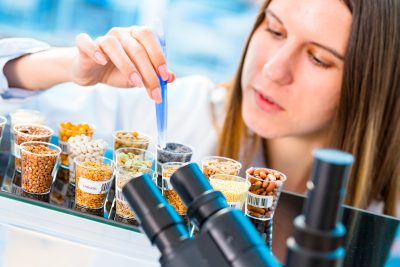Food Science
 This minor addresses food science as an academic discipline that utilizes approaches for solving applied science problems associated with the acquisition and processing of food. All students are required to complete at least 15 credits as outlined below:
This minor addresses food science as an academic discipline that utilizes approaches for solving applied science problems associated with the acquisition and processing of food. All students are required to complete at least 15 credits as outlined below:
-
- All of the following: ANSC/NUSC 1645; ANSC 4341; NUSC 3233.
- One of the following: ANSC 3343, 3641.
- Additional courses from Group B, or the following list to meet the 15 credit total minimum requirement: ANSC 3318, 5641; ARE 3260; NUSC 5500; SPSS 2100.
Students must earn a combined grade point average of 2.5 or higher for all courses listed above. The minor is offered by the Animal Science Department and the Nutritional Sciences Department.
Food Science Minor Recommended Course Sequence
Food Science Minor Plan of Study
Students interested in pursuing this minor should contact Dr. Yangchao Luo at yangchao.luo@uconn.edu
Nutrition for Exercise and Sport

-
- Students interested in earning the minor should be aware that the required courses have prerequisites. These include NUSC 1165, PNB 2264, 2265 and MCB 2000.
- All students are required to complete a minimum of 18 credits for the minor.
- Students in this minor must complete: NUSC 4236, 4250; EKIN 4500, 4510; and two or more of the following courses for an additional 6 credits: NUSC 2241, 4299; EKIN 3099, 3520, 3530; AH 3231 or3234.
Nutrition for Exercise and Sport Minor with Didactic Concentration Recommended Course Sequence
Nutrition for Exercise and Sport Minor Plan of Study
Students who are interested in pursuing this minor should contact Dr. Nancy Rodriguez at nancy.rodriguez@uconn.edu